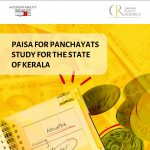
How Important are Deadlines in the Bureaucracy?
5 December 2016
This is the final blog of a five-part series to unpack the meaning of some of the frequently heard terms and phrases in the Indian bureaucracy.
Webster’s definition
Deadline:
1. A date or time before which something must be done
2. A line drawn within or around a prison that a prisoner passes at the risk of being shot (archaic)
Bureaucratic translation:
A date or time before which something must be submitted to higher authorities. Often treated as a relative concept despite being accompanied by circulars promising action against non-compliers.
In our previous posts, we discussed how the work lives of bureaucrats are guided by a volley of circulars, orders and procedures. Deadlines are another factor which shape work priorities. Now, deadlines are something that professionals have to deal with on a regular basis. In the world of the bureaucracy, however, bureaucrats share a peculiar relation with the concept.
Two types of deadlines; too many deadlines
I have seen the bureaucracy tackle two types of deadlines – one is connected to routine administrative work. For teachers to continue teaching students, infrastructure should be in place, salaries must reach teachers on time, staff should be given regular in-service training etc. So a salient role of the bureaucracy is to make sure these tasks are planned, implemented and monitored on a timely basis. The second type is the one dictated by political masters, usually connected to their pet projects. It’s harder to predict when such a type of deadline might be dropped on the bureaucracy since the tasks may not have been planned well beforehand. In that sense, this second type of deadline is more disruptive.
Once a deadline is set at short notice, one sees offices abuzz with activity. Papers fly, circulars and office orders are frantically framed and pushed down the chain of command, meetings are hastily convened to discuss how work must now be re-prioritised, and go-to babus in various government offices are pushed to their limits. In my experience of studying the education bureaucracy, I have noticed mild to severe chaos ensue once a new deadline is set because the bureaucracy is often seen struggling to juggle multiple deadlines. The persistent feeling is that there are too many deadlines and most of these crop up at short notice because of the whims of those in command – either in the bureaucracy or in the political space. Planning is generally viewed as a futile activity as the expectation is that more tasks will be dropped on their heads which would mean more deadlines to battle.
Obvious and thinly veiled threats of action being taken against those who fail to meet the deadline are reinforced through more circulars with ominous clauses, “discussions” in government meetings and increasingly on ‘official’ WhatsApp groups. The peculiar thing is that despite these efforts, missing deadlines is more often than not the norm.
And the issuing of circulars once deadlines are missed – the ones that carry more warnings around action being taken against errant officials – is treated as a ritual in itself.
But work does come in eventually. The system trudges along and delivers in its own time and action is rarely taken if initial deadlines are missed. The impression one gets is that the bureaucracy is not interested in respecting deadlines, and once deadlines are missed, the circulars that are issued and the personal calls that are made to officials are all just rhetoric.
Whose deadline is it anyway?
If we ask why this happens, we will come back to the issues affecting the bureaucracy which have been discussed in the previous posts. Managing a multi-layered, diffused and a highly interdependent public bureaucracy is a massive challenge to begin with. It is bound by orders, circulars, procedures and guidelines to keep parts of it from turning rogue at any point. What does not help is the fact that there is an apparent staff and infrastructure crunch, limited technological literacy, and officials are primarily held accountable for maintaining and transmitting data rather than ensuring high quality services are delivered. Officials often share with us that they deliberately choose to not penalise subordinates if they are unable to deliver on time because “who will do the work then?”
So how important is one deadline over another in the bureaucracy? As important as the degree of heat faced by senior bureaucrats from the hands of their political masters. When a type-2 deadline is imposed routine administration work takes a back-seat and then we see it quickly piling up. Thus begins a vicious cycle – because action will not or cannot be taken against officials who fail to deliver on time, officials’ incentive to even stick to timelines is reduced. This pushes the pace of work back further. Moreover, data that has already been transmitted gets requested in different formats and points in time owing to poor data management which exacerbates the situation. As do half-baked plans that are pushed down from the top resulting in more chaos below and rendering the Deadline relatively meaningless.
Symbols of bureaucracy
This blog series has been an effort to showcase a slice of life inside the mid-level bureaucracy by decoding the meaning of some of the commonly heard terms and phrases. If you look at the terms closely, as listed down by us in the first blog of this series, you will get a sense of the kind of activities the system tends to prioritise. The takeaway is that the bureaucracy tends to make certain activities the end-all of their responsibilities, say creating inspection reports or following rules with blinkers on even if the rules end up causing more harm than good, because of practices that have congealed into a set of norms over the decades. Getting out of this procedural rut and an introspection on the actual requirements of the bureaucracy – be it in the space of capacity building or work rationalisation – is the need of the hour if we have to bring about positive and sustainable improvements in public service delivery.
Vincy Davis works with the Public Administration team at Accountability Initiative. Currently, she is conducting field work for a project which involves analysing the implementation process of key government interventions in education in the NCT of Delhi.





